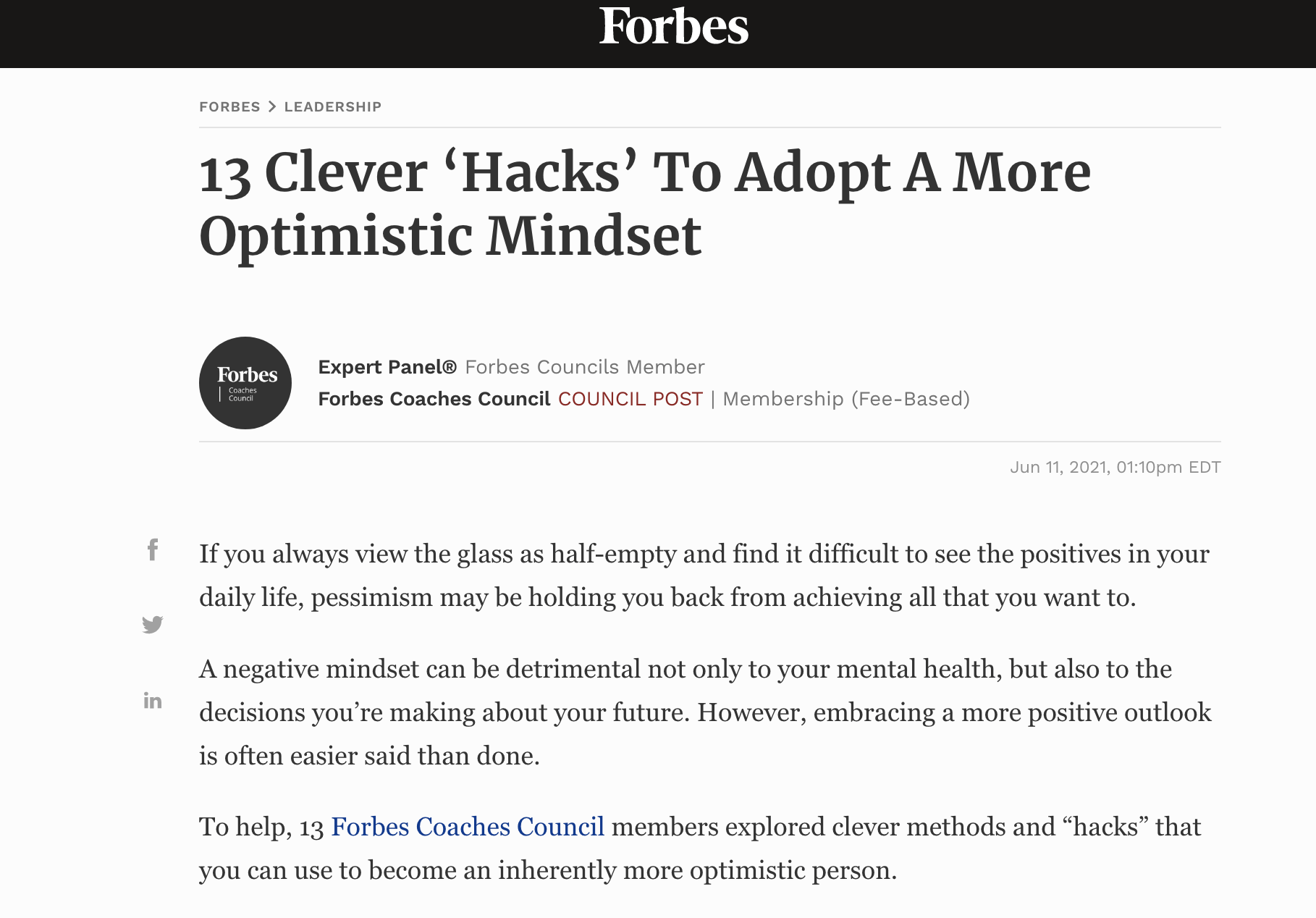If you always view the glass as half-empty and find it difficult to see the positives in your daily life, pessimism may be holding you back from achieving all that you want to.
A negative mindset can be detrimental not only to your mental health, but also to the decisions you’re making about your future. However, embracing a more positive outlook is often easier said than done.
1. Write Down Your Accomplishments
Take a sheet of paper and set a timer for five minutes. Jot down as many personal and work-related accomplishments as you can in that time. When the five minutes are up, review the list and relish in your wins. You’ll feel better almost immediately. Leverage these feelings to think about how to continue your success. – Lisa Walker, Lisa Walker Coaching & Consulting
2. Give Your Brain A Question To Ponder
Our brains are answer-seeking machines. So, give your brain a great question to ponder. Some examples include: What’s another way to look at this situation? What else could be true? What’s the best thing I see in this situation? Have fun with the questions! And another easy thing to do is list three things you’re grateful for. Eventually, your brain will train itself to look for the good in things more often. – Sandi Mitchell, Apex Catalyst Group
3. Surround Yourself With Optimists
Hanging around optimistic people, not reading the news and reading self-help books will give you the strength to take back control of your life. If your circle of friends is pessimistic, that needs to change, or they will always keep you trapped in their reality. It is a matter of self-belief, education and determination. – Peter Boolkah, The Transition Guy
4. Start A Daily Gratitude Practice
When you live in gratitude, you train your mind to search for the positivity around you, which creates a ripple effect in your world. It is hard to live in negativity and scarcity when your focus is on searching for the positive and abundance in life. Gratitude is simple and free. Simply start and end your days by identifying three things to be grateful for. – Clara Capano, Capano Consulting
5. Develop A Daily Mantra
Develop a daily mantra around the best version of yourself, then speak it as if you already are that person using “I am” statements, such as, “I am an optimistic person.” The brain is stickiest 20 minutes after waking, so say that mantra every morning out loud into the bathroom mirror, engaging your auditory and visual senses. With frequent repetition, you will organically become that person over time. – Erin Miller, Erin Miller Inc
6. Reframe Negative Thoughts Into Positive Opportunities
Build a new habit of “reframing.” After you have a negative thought, pause and ask yourself, “How can I flip that around to something positive?” For example, let’s say your team member criticizes your first draft of a report. After you think, “They called my report and me a failure,” stop, and say to yourself, “I have an opportunity to improve my report and how this person views both me and it.” – Liz Guthridge, Connect Consulting Group
7. Analyze Your Expectations
Remember that what we expect becomes a self-fulfilling prophecy. When we expect bad things to happen, our lens filters out the good and finds the bad. When we expect the good, the opposite happens. Knowing that you are creating your own reality can be a powerful incentive. In the words of Henry Ford, “Whether you think you can or you think you can’t—you’re right.” – Maureen Cunningham, Up Until Now Inc.
8. Change Your Language Around Negative Thoughts
Instead of saying, “I’m going to fail,” say, “This shall be.” Write down three things each day that went well; this builds positive momentum over time. Practice gratitude by writing down five things that you are grateful for in your life each day. You can’t be grateful and hateful at the same time. They don’t coexist. – Christine Nielsen, Contrast Coaching & Consulting
9. Appreciate The Little Things
Appreciating the “small stuff” is the secret to creating an optimistic outlook. After all, celebrating tiny triumphs, from asking a thought-provoking question on a client call to having an engaged conversation at a family dinner or hitting your healthy-eating goal for the day, will add to your spiritual energy tank. And it’s neurochemically impossible to be pessimistic when you’re in a state of gratitude. – Deborah Goldstein, DRIVEN Professionals
10. Compare Negative Predictions With Actual Outcomes
One strategy is to consider a time when you predicted something negative would happen: when you thought that you would perform poorly on a task, for example, or that you wouldn’t get that promotion. Then consider what actually happened. Most of the time, the negative outcomes we predict do not come true. Remind yourself that predicting the worst won’t protect you from disappointment; it just leads to more suffering. – Christine Allen, Insight Business Works
11. Study Optimism And The Growth Mindset
Become a student of optimism and the growth mindset. Read about it, practice it and, eventually, teach others how to do it. By creating new habits and holding yourself accountable for changing, you will be able to make slow and steady shifts in your behavior. These will have positive and lasting impacts on your work life, personal life and overall well-being. – Jill Hauwiller, Leadership Refinery
12. Be Completely Present
Be completely present in this current moment and focus on your breathing to relax. Notice that you are fine at this moment. Now, remember a time when you faced a challenge, obstacle or difficult situation that you thought you wouldn’t get through. Identify what you did or how you were supported in getting through that situation. What learning can you apply to help you feel more positive? – Mark Samuel, IMPAQ Corporation
13. Explore What Is Possible
Instead of sharing all of the reasons why an idea won’t work, explore the possibilities of what might be possible. Ask questions to understand others’ perspectives. Share your thoughts on where you align and show appreciation for what they have to say, and you will come across as a much more positive person. – Rochelle Cooper, Success Leaders


